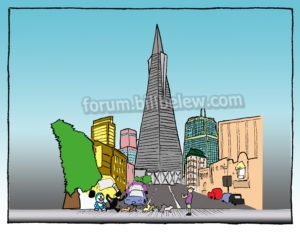Bill Belew has raised 2 bi-cultural kids, now 34 and 30. And he and his wife are now parenting a 3rd, Mia, who is 8.
Business in China is NOT always good it seems.
According to a news report, I read today the Shanghai real estate market seems to be cooling off.
Compared to last year, Shanghai has 1.3 billion square feet of MORE emptied space. That’s a space about 9 x 5 miles big!
About half of Shanghai’s new housing is not used. The reason is simple – Shanghai cities are evicting its citizens and razing their old homes to build new and better. But the prior residents cannot afford the new apartments.
The government is NOT making good on its pledge to make more affordable housing available. It sounds to me like Silicon Valley.
One report out of Beijing’s Normal University, as opposed to the abnormal one…I know they probably hear that too much, sorry….oh, the report said that at least 70% of city dwellers can’t afford to purchase new apartments.
Of the 1.3 billion square feet..60% is in the residential sector.
Let’s see…Heavy investment in property….real estate speculation…lots of construction…lots of borrowing….banks shelling out a lot of money….nobody can afford the new product….loans are defaulted on…banks go belly up….
Is this what an economic bubble looks like?
What do you think?





The real syndrome in the real estate market in Shanghai is that investment choices (the stock market is too turbulent) are few so that it is not surprising that people love making home purchase and most of them are not end-users.
I do not believe that the real estate market in Shanghai is too bubble. The latest information corroborated by JLL and Colliers International is that there will be strong demand for high-end residential units within the downtown area over the next 5 years. Potential for RMB appreciation also whets appetite for more investments from foreign institutional investors.
I also disagree to your view that the municipal government does not make more affordable housing available for the citizens. According to the government plan, there will be an annual supply of 20 mil affordable housing to the citizens.
Andy Xie from Morgan Stanley are used to say that the real estate market in China is too bubble but what I have witnessed is that this US investor has been prepared to purchase another 3-4 buildings in Shanghai in 06.
Thanks for your good comments, Hubert.
Real estate has most always been a good investment. It seems to be the same in Shanghai.
You say that high end residential units will be in demand. This makes sense as Chinese become richer and richer.
Whether or not the government follows through on the affordable housing still remains to be seen.
At the recent Committee of 100 gathering, the general consensus was that the RMB will not be allowed to appreciate anymore.
I am curious as to why you think otherwise.
BTW, do you live in Shanghai? I appreciate getting other perspectives. It helps me to understand as well.
Thanks for visiting and for your comments.
RMB will be appreciated because of strong grievance made by the US government and politicians from the West. Trade unbalance between China and the US has already prompted decision makers in Beijing to plan a gradual appreciation of RMB over the next 5 years.(probably 4% per annum, according to my several discussions with my cronies)
The municipal government in Shanghai has already implemented the 20 mil sq.m. affordable housing for the residents since end-05.
I am used to be a gipsy, travelling between Hong Kong and China and my company has undertaken huge investments in Shanghai. (That is the reason why I am quite familar with the real estate market there).
I think you are a valuable resource when it comes to investing in real estate in Shanghai.
I spoke to the Senate Chairman of US-China relations about a week ago.
About 15 or so years ago, everyone complained about the value of the yen in Japan and how it contributed to the trade imbalance. Heavy pressure was put on Japan. The Yen appreciated and the trade imbalance continued to grow…we just paid more for Japanese products.
I asked Chairman D’Amato why he thought it would be any different in China…he couldn’t answer.
The answer to the imbalance is for America to create more things that China needs at a price the Chinese can afford….messing with the RMB value is not likely to help. It will just make Chinese products more expensive and airplane makers richer.
Thanks again for your insight.
I am totally agree to your view that RMB appreciated is really harmful to the US consumers in the long perspective.
If we believe that the benefit of international trade is to capitalise on comparative advantage of each nation, it is not sensible for the White House to be anxious about trade imbalance between China and the US. However, the BRIC model created by Goldman Sachs has already stated that China will pose an economic threat to the US.
If I were a member of the think tank in the White House, it might be difficult for me to map out an effective strategy for economic prosperity in the US.
It is my pleasure of communicating with you. Your personal profile has revealed that you are very familiar with Asia.
Keep in touch! You can know more about me by making access to http://www.amazon.com. (I have a personal page containing information about myself).
I’d like to say that we should leave economic policies to people smarter than me..but that doesn’t seem to work.
My opinion is that Americans need to get off of their lazy duffs and get back to work making quality products.
Work hard and be fair and things will work themselves out.
After RMB’s appreciation, as Hong Kong is now part of Great China, do you think Hong Kong Dollar will be appreciated too or will it remain nearly the same ?
I was there in HK just a few months ago, the HK dollar is still linked to the US dollar. Check this link out for more detail: http://www.info.gov.hk/hkma/eng/speeches/speechs/joseph/speech_030398b.htm
That means to me, the HK dollar will not appreciate as the main land’s currency appreciates.